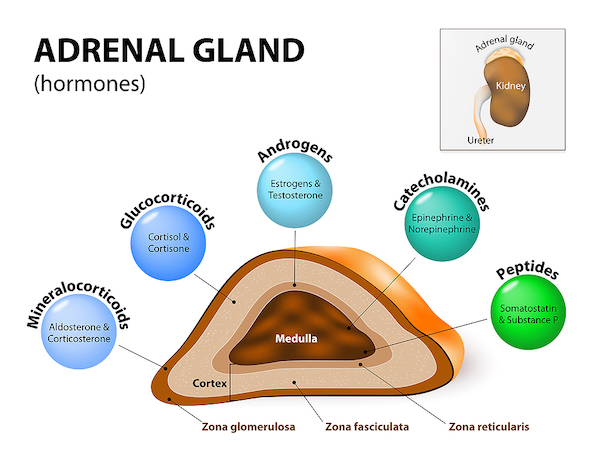Do you feel tired and worn out all the time? Do you crave salty foods? Wonder why you experience brain fog and can’t seem to get enough sleep? Then chances are, your adrenal glands are sapped. Your adrenals perform several vital functions in the body and play an essential role in stress management and hormone balance. Come learn what adrenal fatigue looks like and how you can support your adrenals.
What are Adrenal Glands?
Adrenal glands are small organs located on top of both kidneys. As part of the endocrine system, adrenals secrete several types of hormones. These hormones maintain blood pressure and salt balance and also help our bodies cope with stress.
Structure
Each adrenal gland consists of a medulla (the center of the gland), which is surrounded by the cortex.
Adrenal Medulla
The adrenal medulla produces catecholamines, or adrenaline type hormones, including epinephrine and norepinephrine. These hormones produce the fight or flight response that we experience in times of stress. This is that sudden panicked feeling that causes fear and anxiety. The physiological response may include sweating, increased heart rate, blood pressure, and respiration rate, tingling or trembling, and skin flushing.
Adrenal Cortex
The adrenal cortex produces hormones that help maintain electrolyte balance in the body. These include aldosterone and cortisol. The cortex also produces minute amounts of sex hormones, such as progesterone, testosterone, and estrogen.

Function of the Adrenal Glands
The four main players from the adrenal glands include epinephrine, norepinephrine, aldosterone and cortisol. These four hormones are essential to the body and control many important functions, including:
- metabolism
- blood sugar
- blood pressure
- electrolyte and water balance
- sexual development before and during puberty
- stress response
- the balance of sex hormones, including estrogen and testosterone
Adrenal Fatigue
As you can see, the adrenals influence many body processes. This is why proper adrenal function is so important for wellness. When your adrenal glands become fatigued, it can manifest in various ways.
Adrenal fatigue is thought to occur in response to prolonged stress. When the adrenals become overtaxed by the demand for excess cortisol, eventually they burn out. When this occurs, they can no longer produce sufficient cortisol necessary for optimal body function. This can also result from other stressors, including environmental and dietary influences, toxins, grief, trauma, autoimmune conditions, and the overuse of antibiotics.
Symptoms

- Fatigue
- Poor stress response
- Brain fog
- Frequent headaches
- Cravings for salty and sweet foods
- Decreased immunity
- Trouble sleeping or staying asleep
- Depression
- Weight gain
- Decreased libido
Treatment of Adrenal Fatigue
Because adrenal fatigue results from lifestyle issues, no pharmaceutical treatments are available. Suggested natural remedies include lifestyle changes, such as:

- Decreasing stress
- Consuming a low-sugar/low-caffeine diet
- Avoiding junk food
- Implementing a healthy sleep schedule
- Meditation
- Targeted nutritional supplementation
Supplements
Adaptogenic botanicals top the list of nutritional supplements for supporting the adrenal glands. The term “adaptogen” refers to a category of plants that improve the body’s response to and promote recovery from stress.
Ginseng
Ginseng acts as an anti-inflammatory and antioxidant in the body. Additionally, studies show it benefits the HPA axis, which is the interaction of the hypothalamus, pituitary gland, and adrenal system in response to stress. This adaptogenic benefit makes ginseng a popular herb for supporting adrenal function.
Ashwagandha
Ashwagandha is an Ayurvedic herb sometimes called Indian Ginseng. Taken as a serum, ashwagandha can be especially helpful for stress relief. It can improve stress resistance by lowering serum cortisol levels.
Pantothenic Acid (Vitamin B5)
Evidence indicates adrenal cortex function is compromised in the event of a vitamin B5 deficiency. Administration of pantethine in several experimental models enhanced adrenal cortex function.
Rhodiola rosea
Rhodioloa rosea is another adaptogenic herb that may also help relieve anxiety and depression. It can help reduce stress-related fatigue and lower cortisol, as well as improve cognitive function and concentration.
Magnesium
Insufficient magnesium levels can lead to low stress tolerance, fatigue and depression. Some evidence demonstrates that magnesium deficiency may induce anxiety and HPA axis dysregulation. Therefore, adding a magnesium supplement to your routine can help your body cope with stress.
Vitamin C
The adrenal glands contain one of the highest concentrations of vitamin C in the body. Supplementing with ascorbic acid can lower blood pressure, improve salivary cortisol recovery, and improve subjective psychological stress responses.
Essential Oils
Some essential oils may also help to support and balance the adrenals. Essential oils may help alleviate stress that leads to adrenal overdrive, and they may also help support the endocrine system.
- Nutmeg
- Lavender
- Thyme
- Geranium
- Rosemary
- Chamomile
- Clary sage
Want to dig deeper and learn more about restoring health to your adrenal glands? Come register for the FREE online Adrenal Solutions Summit. This power-packed event takes place from February 1 – 7, and will provide hours of education to help you conquer your adrenal issues.
You can also download my free booklet, 10 Signs Your Adrenals May be in Overdrive.


